BALLPARK SET THREE: Oakland Coliseum, July 1970 – 8:35
I’m Gonna Sit Right Down and Write Myself a Letter, Pennsylvania Polka, Beer Barrel Polka, Sweet Sue, It’s a Sin to Tell a Lie, Dippermouth Blues, Take Me Out to The Ball Game, My Honey’s Lovin’ Arms, Shout ‘em Aunt Tillie (Hallway).mp3
Origins of the Oakland A’s Swingers
The former Kansas City Athletics (1955-68) had been a struggling second division team until Charley Finley moved it to the Bay Area and newly constructed Oakland Coliseum. He rapidly built up the roster, fortifying it with notable pitchers, power-sluggers and colorful personalities: Reggie Jackson, Vida Blue, Willie McCovey, Rollie Fingers, Catfish Hunter.
The Oakland A’s ball team emerged as a juggernaut winning 10 Division West titles and 6 pennant races. In a three-year streak they won the World Series, 1972-1974. Mielke’s band rode their breakout to champions, flying with the team to Series away-games in Cincinnati and New York City.
The name Athletics dated back to the 1860s, suggesting a gentlemen’s amateur sports club. The nickname “A’s” was long used interchangeably with Athletics. Finley switched it officially to Oakland A’s 1972-1980, informally the Swingin’ A’s.
The band started as the All Stars in 1968 playing for the San Francisco Seals hockey team owned by Finley. None of musicians were hockey fans wrote Oxtot in his memoir, “but we enjoyed the fights that broke out in every game.” The hockey team folded but Finley hired them for Oakland A’s home games. After trying several band names, team management imposed the designation Oakland A’s Swingers, unaware of the ironic implications.
Oakland A’s Swingers Live, 1973
Published for the first time, these tapes reveal a rough-and-ready musical outfit shaped by Mielke’s love for New Orleans-ensemble parts, imaginative repertoire, good soloists and clever arranging. Strong instrumental voicing and Bob’s faith in “standing on the chord” gave this little band a big sound.
From an unknown event, this 1973 performance demonstrates the enthusiastic reception given the group by a jazz-oriented audience and the band responding. Banjo player Dick Oxtot was generally their vocalist though Mielke also sang. Dick wore many hats. A full-time professional musician, he was a successful bandleader in his own right who also played bass (tuba and string bass), sang well and composed several decent songs.
SET FOUR: Swingin’ A’s live, 3/11/73
Bill Napier (clarinet), Dick Oxtot (vocals)
Give Me Your Telephone Number.mp3
It Don’t Mean a Thing (If it Ain’t Got That Swing).mp3
Savoy Blues.mp3
Sweet Jennie Lee.mp3
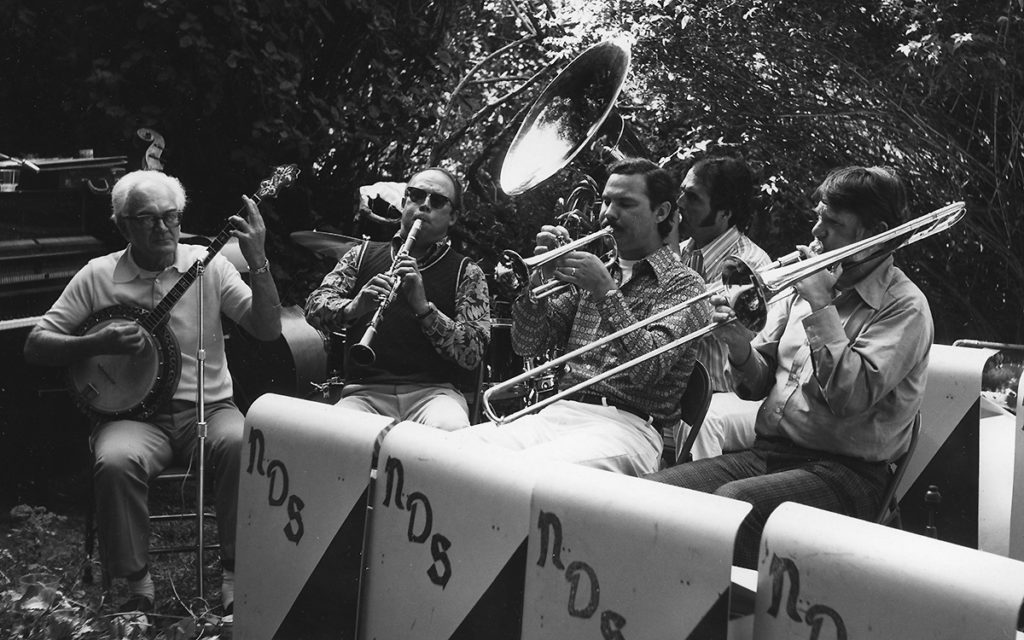
By the early 1970s clarinetist Bill Napier was steady with the band, seen at this casual event photographed by Ed Lawless, 1972.
Bay Recording Studio, Alameda, CA 1982
Hoping for an album Mielke made a demo on spec in 1982, booking a session at Mike Cogan’s recording studio. Cogan had a good sounding room, was skilled at working with this kind of music, knew these musicians and kept production tricks to a minimum. As usual Bob was disappointed by the music produced in a hermetic studio environment, feeling it lacked the vitality and cohesion of their live or festival performances. In the end no album resulted, though a few decent takes have been salvaged.
Mielke took pains to include in his proposed playlist a mixture of early jazz classics like “New Orleans Shuffle” and “Copenhagen,” first waxed by Bix Beiderbecke in 1924. Yet he never overlooked crowd pleasers, including music from ethnic folk sources like “The Kerry Dances” or “La Cucaracha,” the latter one of their most popular offerings in later years.
SET FIVE Bay Studio Session – 1982
Mielke, Napier, Neighbor, Oxtot, Moore
New Orleans Shuffle.mp3
The Kerry Dances.mp3
Copenhagen.mp3
La Cucaracha.mp3
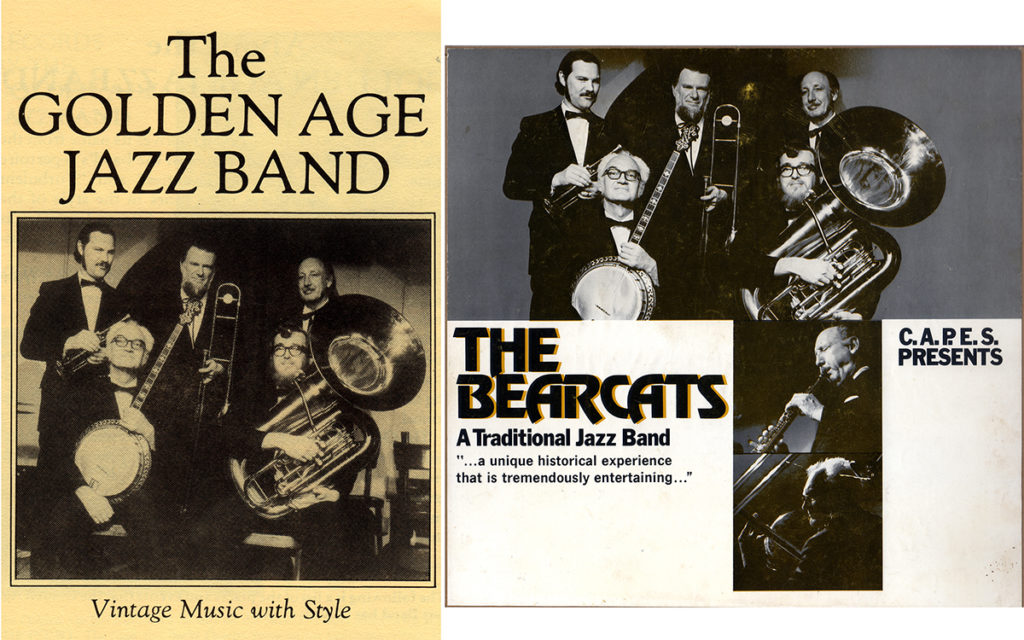
For a while the quintet fulfilled several roles, additionally promoted and booked as Mielke’s Bearcats or Oxtot’s Golden Age Jazz Band, depending on who got what gig.
Booking the Quintet
Mielke was proud to present his robust little band at jazz festivals and in a diverse range of sports, casual or civic venues. Admittedly, it did become less distinctive over time and not dissimilar from the region’s other Dixieland and Traditional Jazz bands.
Clarinet player Bill Napier was focal point for the ensemble in these years. Bill was surely one of the finest clarinetists produced by the Frisco revival, constructing fanciful improvisations, taking surprising turns and jumps. Owlish and self-contained, he was Mielke’s longest and dearest friend.
“Lindbergh, Eagle of the USA” was a specialty of Oxtot and Mielke’s Bearcats dating back to the 1950s. The flag-waving “New Orleans Stomp” was opening theme for this writer’s local radio series, Jazz Rhythm, for 13 years. “Canal Street Blues” is the tune found most often among these surviving tapes.
SET SIX: Stockton, CA Jazz Festival Oct, 1987
Napier (clarinet), Dick Oxtot (vocal)
Take Me Out to the Ball Game.mp3
Lindbergh, Eagle of the USA.mp3
New Orleans Stomp.mp3
Canal Street Blues.mp3
The Horns of Summer
The Swingin’ A’s certainly weren’t the only ensemble presenting this type of ballpark entertainment. For example, in Chicago Mielke’s former associate, cornet player Ted Butterman played more than 35 years with the Chicago Cubs baseball band. Reports Ted, “We started out in front for an hour, then played between innings during the game. Yes, we played ‘tons’ of club dates, parties, casuals, etc. We even played five funerals.”
Baseball is seasonal of course, so Mielke sought other employment for the band at comparable civic venues, booking gigs with San Francisco Warriors basketball (1973) and the Bay Harbor Ferry Fleet (1982). The low point was a grocery store opening. Over time Bob found them regular employment at a steady stream of jazz festivals and casual engagements. And a funeral or two.
In the early 1980s new owners eased Finley out of management and consigned the music to concession areas and tailgate lots. In 1992 the band was discharged entirely in favor of recorded rock music.
Mielke attempted a public lobbying campaign via sympathetic newspaper columnists, but Oakland A’s Baseball moved on. When new opportunities arose, he shifted gears forming Bob Mielke’s New Bearcats with some of the same personnel and continued booking casuals and jazz society events. Today Bob and other surviving band mates enjoy union pensions thanks to their years of service at the baseball park.
Baseball Band Legacy
At the Oakland Coliseum much of the band’s repertoire was not jazz but popular tunes. Yet the music was always delivered in the three-horn New Orleans/Dixieland format of trumpet, clarinet (soprano sax) and trombone, performed up close and personal for even the most remote $3.00 seats.
Charley Finley of Oakland A’s baseball deserves credit for his seasonal patronage of Mielke, Oxtot and associates. Bob Mielke’s jolly Oakland A’s Swingers Strolling Dixieland Jazz Band brought authentic classic jazz and American popular music directly to stadium listeners, jazz fans and civic venues. Their live audiences over nearly a quarter century probably totaled millions, a proud legacy for any group of musicians.
About the author
Dave Radlauer, 2018
Award-winning broadcaster, writer and audio producer presenting vintage jazz since 1982.
The Oakland Swingin’ A’s baseball band will soon be available in the Frisco Jazz Archival Rarities series from Grammercy Records. The story of classic jazz continues at the Jazz Rhythm website: www.JAZZHOTBigstep.com.
Based on interviews of, or discussions and correspondence with Bob Mielke, Ted Butterman, Bob Helm and Richard Hadlock. Great thanks to Bob Mielke for use of his tapes, photos, notes, memories, and corroborating this text. Thanks to Hal Smith for music consultation and assistance. Oxtot quoted from Jazz Scrapbook: Dick Oxtot-Me & Other Stuff, Oxtot, Dick and Jim Goggin, Creative Arts Books (1999).
Audio restored using J-Corder, Nakamichi, Pro Tools, RME d/a, Legacy Speakers and Bybee Quantum products.
- ← Previous page
- (Page 2 of 2)

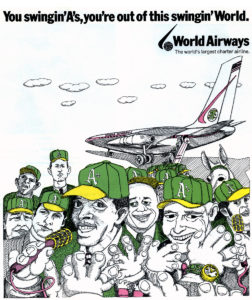
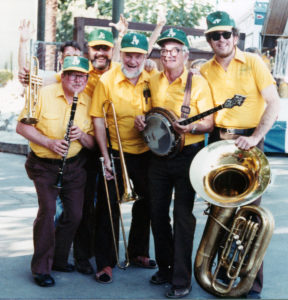
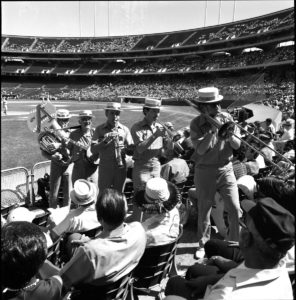
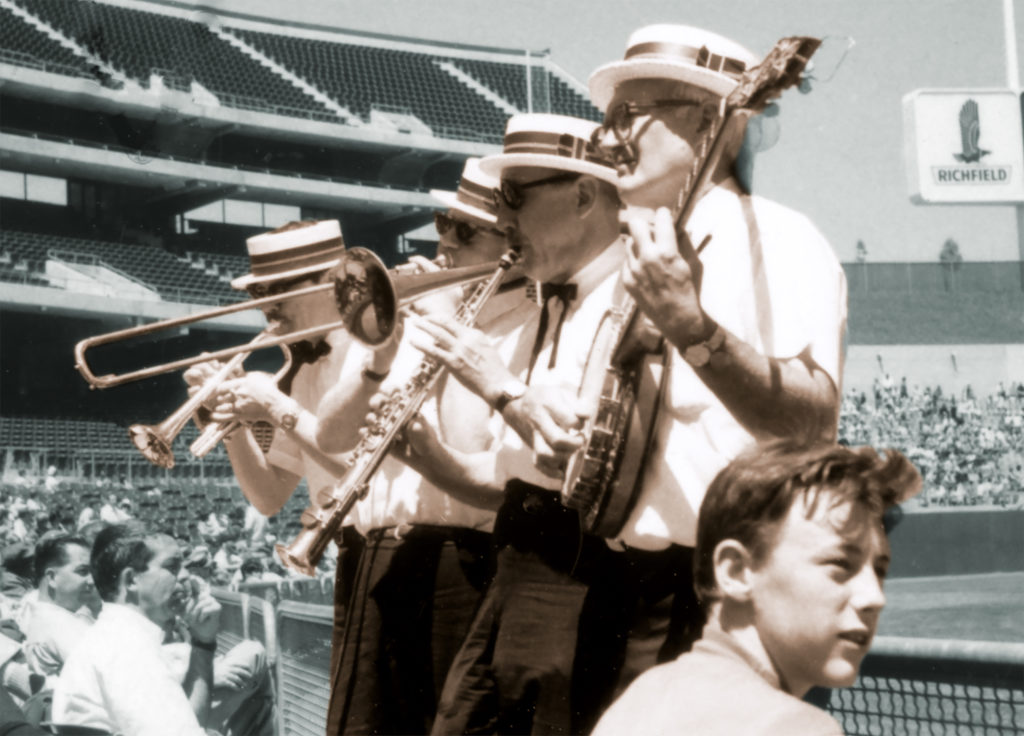
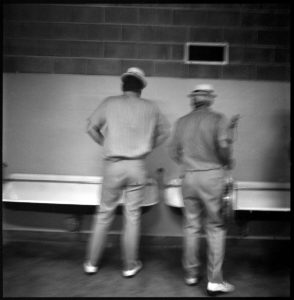
WOW! Some really great material, Dave. Great combo and a lot of fun these guys provided for the ballpark.
As usual a great article.
You’re invited to join me for more classic jazz in its many forms at the JAZZ RHYTHM website:
http://www.JAZZHOTBigstep.com
Or visit:
Oakland Swingin’ A’s
http://jazzhotbigstep.com/745034.html
Bob Mielke
http://jazzhotbigstep.com/247312.html
Bob Helm
http://jazzhotbigstep.com/116001.html
Dick Oxtot
http://jazzhotbigstep.com/486423.html
Thanks for making these clips available, Dave–great stuff! And thanks for including me in your mail out notice.